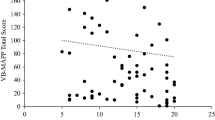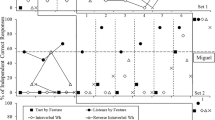Abstract
The present study evaluated the effectiveness of five packaged protocols from the Promoting the Emergence of Advanced Knowledge (PEAK) curriculum. The skills targeted in the study included complex verbal operants proposed by Skinner (Verbal behavior. Englewood Cliffs, NJ: Prentice Hall, 1957), an area that is lacking in the current literature. The target skills included autoclitics, metonymical tacts, tacting planet names, and guessing. The results suggest that the PEAK methodology was effective in teaching each of the targeted skills to a mastery criterion, as well as maintenance of those skills at a 2-week follow-up phase.

Similar content being viewed by others
References
DeLeon, I. G., & Iwata, B. A. (1996). Evaluation of a multiple‐stimulus presentation format for assessing reinforcer preferences. Journal of Applied Behavior Analysis, 29(4), 519–533.
Dixon, M. R. (2014). Promoting the emergence of advanced knowledge relational training system: direct training module. Carbondale, IL: Shawnee Behavioral Press.
Dymond, S., O’Hora, D., Whelan, R., & O’Donovan, A. (2006). Citation analysis of Skinner’s verbal behavior: 1984–2004. The Behavior Analyst, 29(1), 75–88.
Gould, E., Dixon, D. R., Najdowski, A. C., Smith, M. N., & Tarbox, J. (2011). A review of assessments for determining the content of early intensive behavioral intervention programs for autism spectrum disorders. Research in Autism Spectrum Disorders, 5, 990–1002. doi:10.1016/j.rasd.2011.01.012.
Love, J. R., Carr, J. E., Almason, S. M., & Petursdottir, A. I. (2009). Early intensive behavioral intervention for autism: a survey of clinical practices. Research in Autism Spectrum Disorders, 3, 421–428. doi:10.1016/j.rasd.2008.08.008.
Skinner, B. F. (1957). Verbal behavior. Englewood Cliffs, NJ: Prentice Hall.
Sundberg, M. L., & Michael, J. (2001). The benefits of Skinner’s analysis of verbal behavior for children with autism. Behavior Modification, 25, 698–724. doi:10.1177/0145445501255003.
Wingate, M., Kirby, R. S., Pettygrove, S., Cunniff, C., Schulz, E., Ghosh, T., & Yeargin-Allsopp, M. (2014). Prevalence of autism spectrum disorder among children aged 8 years—Autism and Developmental Disabilities Monitoring Network, 11 sites, United States, 2010. MMWR Surveillance Summaries, 63(2), 1–21.
Author information
Authors and Affiliations
Corresponding author
Rights and permissions
About this article
Cite this article
McKeel, A.N., Rowsey, K.E., Belisle, J. et al. Teaching Complex Verbal Operants with the PEAK Relational Training System. Behav Analysis Practice 8, 241–244 (2015). https://doi.org/10.1007/s40617-015-0067-y
Published:
Issue Date:
DOI: https://doi.org/10.1007/s40617-015-0067-y




